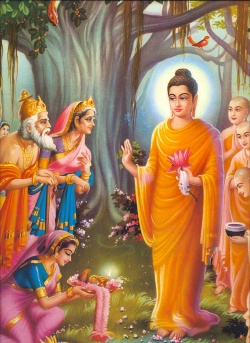Difference between revisions of "Buddha's Visit to Rahula Mata"
m (Text replace - "not being" to "not being") |
|||
| Line 4: | Line 4: | ||
Upon reaching [[Kapilavatthu]] the [[Buddha]] stayed at [[Nigrodharama]] to show some [[miracles]] (Yamakapathihariya) to demonstrate his achievements to his kinsmen. There, he also narrated the story of the Vessantara [[Jataka]]. | Upon reaching [[Kapilavatthu]] the [[Buddha]] stayed at [[Nigrodharama]] to show some [[miracles]] (Yamakapathihariya) to demonstrate his achievements to his kinsmen. There, he also narrated the story of the Vessantara [[Jataka]]. | ||
| − | On the following day, as | + | On the following day, as not being invited in any house for his meals, the [[Buddha]] went on begging in the streets of [[Kapilavatthu]]. Having [[heard]] that his son was begging in the streets of his kingdom, the [[king]] was deeply disturbed. But upon [[hearing]] that begging was an acceptable custom for a [[monk]] he did not [[mind]] it and invited him and his [[monks]] at the royal palace. There, all the royal ladies, too, visited him to honour him. Rahulamata ([[Yashodhara]]), however, was the only exception. Having [[heard]] of her [[grief]] and [[virtues]], the [[Buddha]] went to see her in her apartment to praise her. There, he narrated the story of Chandakinnara [[Jataka]], which portrayed her [[character]] as a loyal and [[virtuous]] wife in one of her previous [[births]] when she was born as a {{Wiki|female}} [[kinnara]] and had made her slain husband alive by [[virtue]] of her loyalty. |
See Theragatha527-36; [[Theragatha]] [[Atthakatha]] i.997; [[Dhammapada]] [[Atthakatha]] 1.96 f | See Theragatha527-36; [[Theragatha]] [[Atthakatha]] i.997; [[Dhammapada]] [[Atthakatha]] 1.96 f | ||
Latest revision as of 19:11, 8 September 2013
Once the Buddha received an invitation from his father through Kaludayi to visit Kapilavatthu. Even earlier his father had sent several messengers; but none in turn ever returned. This was because of the influence of the Buddha’s personality, which tempted them to lead a monastic life. Kaludayi, too, became a monk as an influence of the Buddha, yet he accomplished his mission, though after two months of persuasions to the latter to visit Kapilavatthu.
Upon reaching Kapilavatthu the Buddha stayed at Nigrodharama to show some miracles (Yamakapathihariya) to demonstrate his achievements to his kinsmen. There, he also narrated the story of the Vessantara Jataka.
On the following day, as not being invited in any house for his meals, the Buddha went on begging in the streets of Kapilavatthu. Having heard that his son was begging in the streets of his kingdom, the king was deeply disturbed. But upon hearing that begging was an acceptable custom for a monk he did not mind it and invited him and his monks at the royal palace. There, all the royal ladies, too, visited him to honour him. Rahulamata (Yashodhara), however, was the only exception. Having heard of her grief and virtues, the Buddha went to see her in her apartment to praise her. There, he narrated the story of Chandakinnara Jataka, which portrayed her character as a loyal and virtuous wife in one of her previous births when she was born as a female kinnara and had made her slain husband alive by virtue of her loyalty.
See Theragatha527-36; Theragatha Atthakatha i.997; Dhammapada Atthakatha 1.96 f
